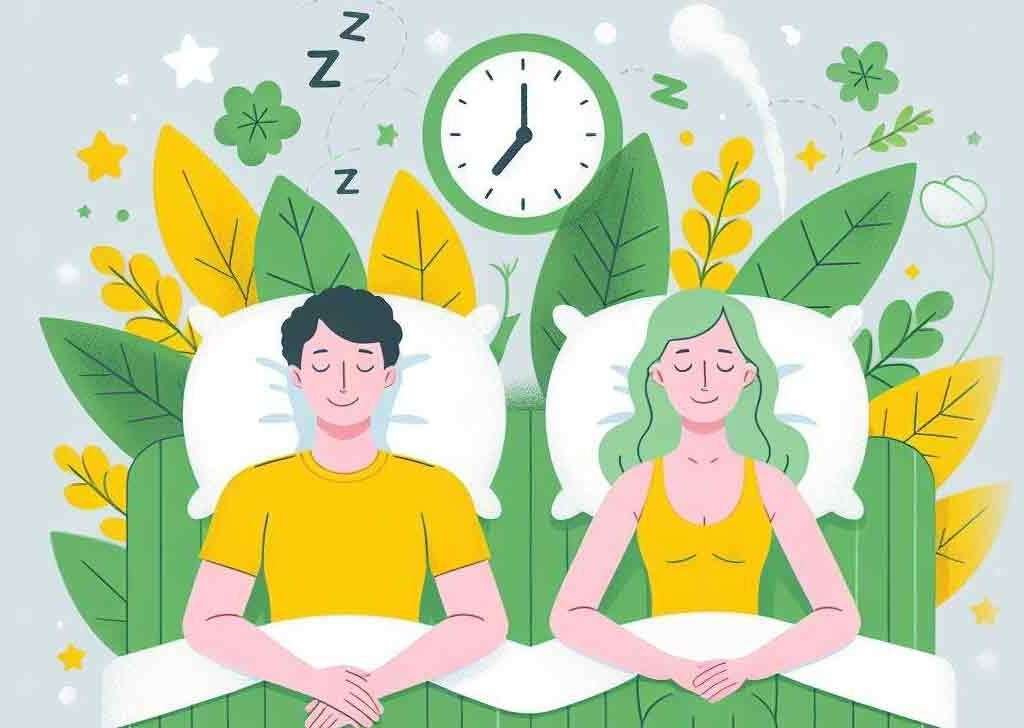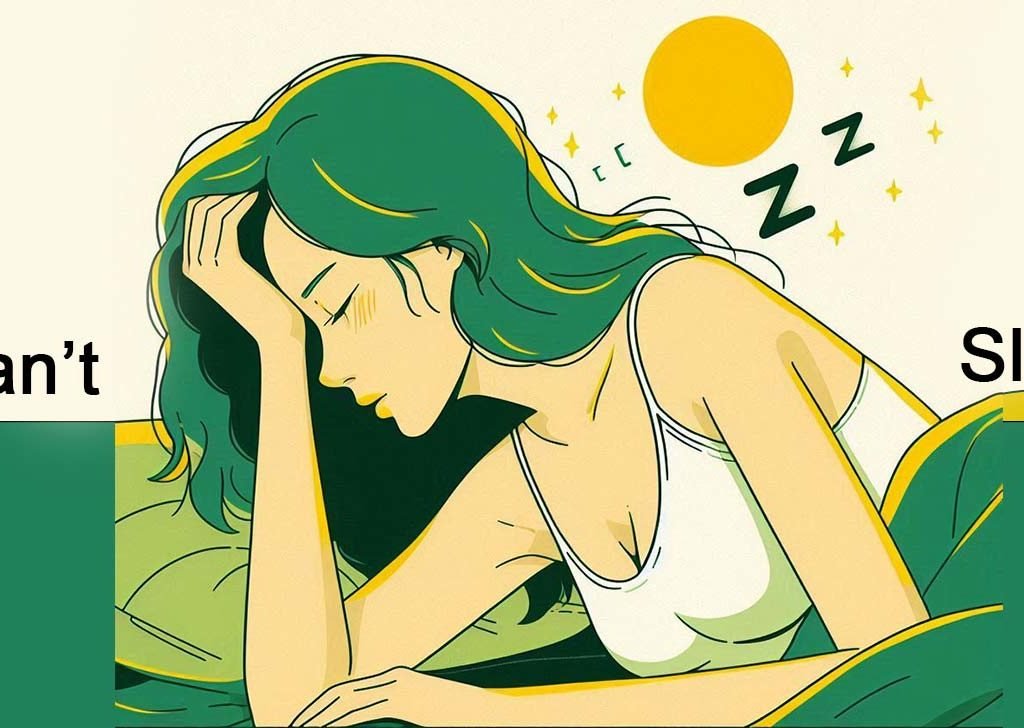Poor sleep in your 40s is linked to accelerated brain aging later in life. Insufficient rest can impair cognitive functions and increase the risk of neurological issues.
As people enter their 40s, sleep patterns often change, leading to restless nights and reduced sleep quality. This decline in sleep can have significant implications for brain health. Research indicates that poor sleep during this decade may contribute to faster cognitive decline and increased vulnerability to dementia.
The brain requires adequate rest to consolidate memories and maintain mental clarity. Prioritizing sleep becomes essential for overall well-being and long-term cognitive function. Addressing sleep issues early can pave the way for healthier aging and a sharper mind in the years to come. Understanding this connection can empower individuals to make better lifestyle choices.

The Hidden Impact Of Poor Sleep On Aging
Poor sleep in your 40s can affect brain health later. Many people underestimate sleep’s role in aging. Quality sleep supports brain functions. Lack of it may speed up cognitive decline.
The Science Behind Sleep And Aging
Research shows sleep is vital for brain health. During deep sleep, the brain removes toxins. These toxins can lead to neurological diseases. Here are some key points:
- Deep sleep cleanses the brain.
- Sleep helps form new memories.
- Sleep regulates mood and stress.
Chronic sleep deprivation can accelerate brain aging. Studies suggest a link between sleep and cognitive decline.
Decoding The Brain-sleep Connection
The brain relies on sleep for repair. During sleep, the brain strengthens connections. This process is crucial for learning and memory. Poor sleep disrupts these connections.
Here’s how sleep affects the brain:
| Aspect | Impact of Poor Sleep |
|---|---|
| Memory Formation | Impaired memory retention and recall. |
| Mood Regulation | Increased anxiety and mood swings. |
| Cognitive Function | Slower reaction times and decision-making. |
Understanding this connection is vital. Better sleep can lead to a healthier brain. Prioritize sleep to protect your cognitive abilities.
Navigating The 40s: Sleep Challenges
The 40s can bring unique sleep challenges. Many people notice changes in their sleep patterns. These changes can impact overall health and brain function. Poor sleep during this decade may lead to faster brain aging later in life.
Hormonal Changes And Sleep
Hormonal shifts are common in the 40s. These shifts can disrupt sleep cycles. Here are some key hormonal changes affecting sleep:
- Menopause: Women may experience hot flashes and night sweats.
- Testosterone Levels: Men may see a decrease in testosterone, affecting sleep quality.
- Cortisol: Stress can lead to increased cortisol, causing sleep disturbances.
Understanding these changes can help manage sleep issues. Focus on maintaining a consistent sleep schedule. Create a calm bedtime routine to promote better sleep.
Stress, Anxiety, And Insomnia
Stress and anxiety levels often rise in the 40s. This can lead to insomnia or poor sleep quality. Key factors include:
| Factor | Impact on Sleep |
|---|---|
| Work Pressure | Increases stress, making it hard to relax. |
| Family Responsibilities | Can cause anxiety, leading to restless nights. |
| Health Concerns | Worry about health can disrupt sleep patterns. |
To combat stress and anxiety, consider these tips:
- Practice relaxation techniques like meditation.
- Engage in regular physical activity.
- Limit screen time before bed.
- Seek professional help if needed.
Taking these steps may improve sleep quality. Better sleep can enhance overall well-being and brain health.
Understanding Brain Aging
Brain aging is a natural process. It affects everyone differently. Factors like sleep quality play a significant role. Poor sleep in your 40s may speed up this process. Understanding how the brain ages helps in making informed choices.
Key Indicators Of Brain Aging
Recognizing the signs of brain aging is crucial. Some common indicators include:
- Memory Loss: Forgetting recent events or conversations.
- Difficulty Concentrating: Trouble focusing on tasks.
- Slower Processing Speed: Taking longer to understand information.
- Changes in Mood: Increased feelings of anxiety or depression.
These signs can signal changes in brain health. Keeping track of them is important for early intervention.
Impact Of Lifestyle On Brain Health
Lifestyle choices significantly affect brain aging. Here are key factors to consider:
| Lifestyle Factor | Impact on Brain Health |
|---|---|
| Sleep Quality | Good sleep supports memory and learning. |
| Physical Activity | Regular exercise boosts blood flow to the brain. |
| Nutrition | A balanced diet helps maintain cognitive function. |
| Stress Management | Managing stress improves overall mental health. |
Making positive changes in these areas can slow down brain aging. Prioritizing healthy habits benefits both mental and physical health.
Sleep Deprivation: Accelerating Brain Aging?
Sleep deprivation is a serious issue for many adults in their 40s. Studies show that poor sleep can lead to faster brain aging. This effect can impact memory, decision-making, and overall cognitive health later in life.
Studies Linking Sleep And Cognitive Decline
Numerous studies reveal a strong connection between sleep and brain health. Here are some key findings:
- Harvard Study: Found that sleep-deprived individuals showed significant memory loss.
- University of California: Reported that lack of sleep increases the risk of Alzheimer’s.
- Journal of Neuroscience: Linked poor sleep to a decrease in brain volume.
| Study | Findings |
|---|---|
| Harvard Study | Memory loss in sleep-deprived individuals. |
| University of California | Increased risk of Alzheimer’s. |
| Journal of Neuroscience | Decrease in brain volume. |
Mechanisms: How Lack Of Sleep Affects The Brain
The brain relies on sleep to function properly. Here are key mechanisms affected by sleep deprivation:
- Neuron Repair: Sleep helps repair brain cells. Lack of sleep slows this process.
- Memory Consolidation: Sleep is crucial for storing memories. Without it, memories fade.
- Brain Detoxification: Sleep allows the brain to clear toxins. Poor sleep leads to toxin build-up.
Understanding these mechanisms can help individuals prioritize sleep. Better sleep habits can lead to improved cognitive health.
The Role Of Rem Sleep In Brain Health
REM sleep, or Rapid Eye Movement sleep, plays a crucial role in brain health. This stage of sleep is vital for various mental functions. Poor REM sleep can lead to faster brain aging. Understanding its importance is essential for maintaining cognitive function.
Understanding Rem Sleep
During REM sleep, the brain becomes highly active. Heart rate and breathing increase. This stage usually occurs about 90 minutes after falling asleep.
- Dreaming occurs primarily during this stage.
- Muscle activity is suppressed to prevent acting out dreams.
- REM sleep cycles repeat several times throughout the night.
Adults typically spend 20-25% of their sleep in REM. This time is essential for mental restoration.
Rem Sleep And Memory Consolidation
REM sleep greatly influences memory consolidation. It helps in storing new information. The brain processes experiences during this stage.
Key benefits of REM sleep for memory include:
- Enhanced Learning: Information retention improves.
- Problem-Solving: Creative thinking is boosted.
- Emotional Processing: Emotions connected to memories are processed.
Research shows that lack of REM sleep affects memory negatively. Individuals may find it hard to recall information. Prioritizing REM sleep can improve overall cognitive health.

Credit: www.newsweek.com
Lifestyle Adjustments For Better Sleep
Improving sleep quality in your 40s is vital. Simple lifestyle changes can make a big difference. Focus on your diet and exercise. Both play a key role in your sleep health.
Diet And Sleep Quality
Your diet significantly impacts how well you sleep. Certain foods can help you sleep better. Others may disrupt your sleep cycle. Consider these dietary tips:
- Limit caffeine intake, especially in the afternoon.
- Reduce alcohol consumption. It can interrupt your sleep.
- Eat foods rich in melatonin, like:
- Cherries
- Bananas
- Oats
- Include magnesium-rich foods, such as:
- Nuts
- Seeds
- Leafy greens
- Stay hydrated, but avoid heavy meals before bedtime.
Exercise And Its Benefits For Sleep
Regular physical activity improves sleep quality. Exercise reduces stress and anxiety. It also helps regulate your body’s sleep-wake cycle. Aim for at least 30 minutes of moderate exercise most days. Here are some effective exercises for better sleep:
| Type of Exercise | Benefits |
|---|---|
| Walking | Boosts mood and reduces stress |
| Yoga | Promotes relaxation and flexibility |
| Swimming | Low-impact and soothing |
| Cycling | Improves cardiovascular health |
Find activities you enjoy. Stick to a routine for best results. Exercise earlier in the day for optimal sleep benefits.
The Technology Trap: Blue Light And Sleep Quality
In today’s world, technology plays a big role in our lives. Many people use screens late into the night. This habit can disrupt sleep patterns. Poor sleep in your 40s can speed up brain aging. Understanding the effects of blue light is crucial for better sleep.
Effects Of Screen Time On Sleep
Screen time affects sleep quality in several ways:
- Blue Light Exposure: Devices emit blue light that keeps the brain alert.
- Melatonin Suppression: Blue light reduces melatonin, the sleep hormone.
- Increased Alertness: Engaging content can make it hard to wind down.
- Sleep Cycle Disruption: Late-night use can shift sleep cycles, leading to insomnia.
Research shows that people who use screens before bed often sleep less. This poor sleep can lead to cognitive decline over time. Protecting your sleep is essential for brain health.
Managing Technology For Better Sleep
Here are some tips to reduce blue light exposure:
- Set Screen Time Limits: Avoid screens at least one hour before bed.
- Use Blue Light Filters: Many devices have settings to reduce blue light.
- Choose Night Mode: Activate night mode on devices for softer lighting.
- Engage in Non-Screen Activities: Read a book or listen to calming music.
Creating a sleep-friendly environment is vital:
| Tip | Description |
|---|---|
| Dark Room | Use blackout curtains to block outside light. |
| Comfortable Bedding | Invest in a good mattress and pillows. |
| Cool Temperature | Keep the room cool for better sleep quality. |
| Limit Noise | Use earplugs or white noise machines to reduce disturbances. |
Implementing these strategies can improve sleep quality. Better sleep can help maintain brain health as you age.
Sleep Hygiene: Building A Better Sleep Environment
Good sleep hygiene can greatly improve your sleep quality. A better sleep environment reduces distractions. This helps your body and mind rest effectively.
Creating A Sleep-friendly Bedroom
Your bedroom should promote relaxation. Follow these tips to create a sleep-friendly space:
- Keep it dark: Use blackout curtains to block outside light.
- Control the temperature: Aim for a cool room, around 60-67°F.
- Minimize noise: Use white noise machines or earplugs.
- Choose comfy bedding: Select a mattress and pillows that support you.
- Limit electronics: Keep screens out of the bedroom.
These steps can enhance your sleep experience. A calm, comfortable bedroom promotes better sleep.
The Importance Of A Pre-sleep Routine
A pre-sleep routine signals your body it’s time to wind down. Follow these simple steps:
- Set a regular bedtime: Go to bed and wake up at the same time.
- Unplug from screens: Avoid phones, tablets, and TVs at least one hour before bed.
- Relax with activities: Read a book or take a warm bath.
- Practice mindfulness: Try deep breathing or meditation to calm your mind.
A consistent pre-sleep routine helps your body relax. It prepares you for a restful night.
Mindfulness And Relaxation Techniques
Practicing mindfulness and relaxation techniques can improve sleep quality. These methods help calm the mind and reduce stress. Both factors contribute to better sleep in your 40s.
Implementing these techniques can slow down brain aging. Techniques like meditation and breathing exercises are effective.
Meditation For Sleep Improvement
Meditation helps focus your mind. This practice can lead to deeper sleep. Here are some simple meditation techniques:
- Guided Meditation: Listen to recordings that guide you through relaxation.
- Body Scan: Focus on each part of your body, releasing tension.
- Mindfulness Meditation: Observe your thoughts without judgment.
Try to meditate for 10-15 minutes each night. This can significantly improve sleep quality.
Breathing Exercises For Relaxation
Breathing exercises promote relaxation and reduce anxiety. They can help prepare your body for sleep. Here are a few techniques to try:
- 4-7-8 Breathing: Inhale for 4 seconds, hold for 7, exhale for 8.
- Diaphragmatic Breathing: Breathe deeply through your diaphragm, not your chest.
- Box Breathing: Inhale for 4, hold for 4, exhale for 4, hold for 4.
Perform these exercises daily. They can enhance relaxation and support better sleep.
The Impact Of Sleep Medication
Poor sleep in your 40s can lead to serious brain aging later. Many people turn to sleep medication for relief. While these drugs provide short-term help, they may have lasting effects. Understanding these impacts is crucial for better sleep health.
Short-term Relief Vs. Long-term Effects
Sleep medications can offer quick relief for insomnia. However, they come with potential drawbacks:
- Dependency: Many users become reliant on them.
- Tolerance: Over time, higher doses may be needed.
- Cognitive Decline: Some studies link long-term use to faster brain aging.
Short-term use might be acceptable. Long-term reliance can lead to serious issues.
Here’s a quick comparison:
| Aspect | Short-Term Relief | Long-Term Effects |
|---|---|---|
| Dependency | Low | High |
| Cognitive Impact | Minimal | Potentially Severe |
| Sleep Quality | Improved | May Decrease |
Natural Alternatives To Sleep Medication
Finding natural sleep aids can be beneficial. Here are some effective options:
- Herbal Teas: Chamomile and valerian root promote relaxation.
- Meditation: Practicing mindfulness helps calm the mind.
- Sleep Hygiene: Create a dark, quiet, and cool sleeping environment.
- Regular Exercise: Physical activity improves sleep quality.
These alternatives can help improve sleep without harmful side effects. Prioritize natural methods for better long-term health.
When To Seek Professional Help
Poor sleep in your 40s can lead to serious health issues. It affects brain health and speeds up aging. Recognizing the right time to seek help is crucial. Many signs indicate that professional assistance is necessary. Addressing sleep problems early can improve overall well-being.
Signs Your Sleep Issues Need Medical Attention
- Persistent Insomnia: Trouble falling or staying asleep for weeks.
- Daytime Fatigue: Feeling excessively tired during the day.
- Snoring or Gasping: Loud snoring or choking sounds during sleep.
- Concentration Issues: Difficulty focusing or remembering things.
- Frequent Headaches: Regular headaches upon waking.
- Restless Legs: Uncomfortable sensations in the legs while resting.
What To Expect From A Sleep Specialist
Seeing a sleep specialist can lead to effective treatment. During your visit, expect a thorough evaluation. Here’s what typically happens:
- Initial Consultation: Discuss your sleep patterns and health history.
- Sleep Study: You may undergo a sleep study, either at home or in a lab.
- Diagnosis: The specialist will identify any sleep disorders.
- Treatment Plan: Expect a personalized plan, which may include:
- Cognitive Behavioral Therapy (CBT)
- Sleep hygiene education
- Medication if necessary
Addressing sleep issues can enhance life quality. Don’t hesitate to seek help.

Credit: www.medicalnewstoday.com
The Future Of Sleep Science
The field of sleep science is evolving rapidly. Researchers explore how sleep affects our brains. Poor sleep in our 40s may speed up brain aging. Understanding this link is crucial for future health.
Emerging Research On Sleep And Aging
New studies reveal fascinating insights about sleep’s role in brain health. Here are key findings:
- Sleep Quality: Poor sleep quality can lead to memory loss.
- Deep Sleep: Deep sleep stages are vital for brain repair.
- Sleep Duration: Less than 7 hours can increase cognitive decline.
Research shows that sleep patterns shift as we age. Disrupted sleep may affect older adults more. Scientists study how sleep impacts neurodegenerative diseases.
Innovations In Sleep Technology
Technological advancements are changing how we approach sleep. Innovative tools help monitor and improve sleep quality:
| Device | Function | Benefits |
|---|---|---|
| Smart Mattresses | Adjust firmness based on sleep position | Enhances comfort and support |
| Wearable Sleep Trackers | Monitor sleep stages and patterns | Provides insights for better sleep |
| Sleep Apps | Offer relaxation techniques and sleep sounds | Promotes a calming bedtime routine |
These tools help people optimize their sleep. Better sleep leads to improved brain health. The future of sleep science looks promising.
Personal Stories: Recovering From Sleep Deprivation
Many people struggle with sleep deprivation, especially in their 40s. Poor sleep can lead to faster brain aging. Real stories show how individuals overcame this challenge. Their journeys inspire others to improve their sleep habits.
Journeys Of Improvement
Here are some personal stories from people who faced sleep issues:
- Lisa’s Journey: Lisa, a busy mom, often woke up tired. She decided to set a bedtime routine. She turned off screens an hour before bed. Now, she sleeps better and feels more energetic.
- Mark’s Experience: Mark struggled with work stress. He found meditation helped him relax. By practicing mindfulness, he improved his sleep quality significantly.
- Sarah’s Transformation: Sarah suffered from insomnia for years. She sought help from a sleep specialist. With therapy and lifestyle changes, her sleep improved dramatically.
Lessons Learned
These stories share common lessons about overcoming sleep deprivation:
| Lesson | Description |
|---|---|
| Establish a Routine | Set a regular sleep schedule for consistency. |
| Limit Screen Time | Avoid screens before bedtime to reduce distractions. |
| Practice Relaxation | Use meditation or deep breathing to unwind. |
| Seek Professional Help | Consult a specialist for persistent sleep issues. |
Improving sleep can lead to better brain health. These personal stories highlight the importance of taking action. Small changes can make a big difference.
Building A Community For Sleep Support
Sleep problems can feel isolating. Many people struggle silently. Building a community provides support and understanding. It can help improve sleep quality and mental health.
Online Forums And Support Groups
Online forums offer a platform for sharing experiences. Here, individuals can discuss sleep issues openly. Some popular forums include:
- Reddit – Various subreddits focus on sleep challenges.
- Sleep Foundation Forum – A dedicated space for sleep discussions.
- Facebook Groups – Many groups focus on sleep support.
Online support groups provide:
- Advice from others facing similar challenges.
- Resources for better sleep practices.
- A sense of belonging and reduced isolation.
The Role Of Family And Friends
Family and friends can significantly influence sleep health. Their support is vital for better sleep habits. Here are ways they can help:
- Encouragement – Remind each other to prioritize sleep.
- Join Activities – Engage in calming activities together.
- Accountability – Hold each other accountable for sleep routines.
Sharing sleep goals with loved ones creates a supportive environment. This support can lead to lasting changes in sleep patterns.
The Path Forward: Committing To Better Sleep
Good sleep is crucial for everyone, especially in your 40s. Poor sleep can lead to faster brain aging. Taking steps now can improve sleep quality. Here are effective strategies to enhance your rest.
Setting Realistic Sleep Goals
Start by establishing clear sleep goals. Here are some tips to create effective goals:
- Aim for 7-9 hours of sleep each night.
- Choose a consistent bedtime and wake-up time.
- Limit daytime naps to 20-30 minutes.
- Reduce screen time at least one hour before bed.
Track your goals weekly. Adjust them if needed. Stay flexible but focused on improvement.
Monitoring Progress And Making Adjustments
Regularly check your sleep patterns. Use a sleep diary or app to track:
| Date | Hours Slept | Sleep Quality (1-10) | Notes |
|---|---|---|---|
| 01/01 | 7 | 8 | Felt refreshed |
| 01/02 | 6 | 6 | Had trouble falling asleep |
Review your notes. Identify patterns and challenges. Adjust your routine based on what you learn.
Consider these strategies:
- Change your bedtime if you struggle to fall asleep.
- Try relaxation techniques like deep breathing.
- Consult a doctor for persistent sleep issues.
Commit to these changes. Better sleep now leads to a healthier brain later.

Credit: fortune.com
Frequently Asked Questions
How Does Poor Sleep Affect Brain Aging?
Poor sleep can lead to cognitive decline and faster brain aging. In your 40s, insufficient sleep disrupts essential processes, impacting memory and learning. Chronic sleep deprivation can accelerate the brain’s aging process, increasing the risk of neurodegenerative diseases later in life.
What Are The Signs Of Sleep Deprivation?
Signs of sleep deprivation include fatigue, irritability, and difficulty concentrating. You may also experience memory issues and mood swings. Recognizing these signs early is crucial to address sleep problems and mitigate their long-term effects on brain health.
Can Sleep Quality Improve Brain Health?
Yes, improving sleep quality can enhance brain health. Better sleep promotes cognitive function and memory retention. Establishing a consistent sleep routine and creating a restful environment can significantly benefit your overall brain health and slow down aging.
What Age Does Sleep Quality Typically Decline?
Sleep quality often declines in your 40s and beyond. Factors such as stress, hormonal changes, and lifestyle choices contribute to this decline. Understanding these changes can help you take proactive steps to maintain better sleep and brain health.
Conclusion
Prioritizing quality sleep in your 40s is crucial for long-term brain health. Poor sleep can accelerate brain aging and cognitive decline. Adopting healthy sleep habits now may safeguard your mental agility later in life. Take action today to improve your sleep and protect your brain for the future.
Sleep well, think well!



